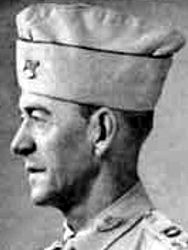Harry A. “Paddy” Flint graduated from the U.S. Military Academy at West Point, Class of 1912. At more than 50 years of age, he was considered too old to serve overseas as a combat commander in World War II, but with the help of high-placed friends, such as Gen. George S. Patton, Jr., he was assigned command of the 39th Regiment in Sicily in 1943. There he created the famous battle slogan, “Anything, Anywhere, Anytime, Bar Nothing!” He was killed In action as a U.S. Army Colonel in 1944.

–
Cemetery:
Awards Received
-

Silver Star
-

Distinguished Service Cross
-

Silver Star
-

Distinguished Service Cross
-

Legion of Merit
-

Silver Star
-
Silver Star
Service:
United States ArmyRank:
Colonel (Cavalry)Regiment:
39th Infantry RegimentDivision:
9th Infantry DivisionAction Date:
World War II
Headquarters, 4th Infantry Division, General Orders No. 68 (1944)(Citation Needed) – SYNOPSIS: The President of the United States of America, authorized by Act of Congress July 9, 1918, takes pleasure in presenting a Second Bronze Oak Leaf Cluster in lieu of a Third Award of the Silver Star to Colonel (Cavalry) Harry Albert Flint (ASN: 0-3377), United States Army, for gallantry in action while serving as Commanding Officer of the 39th Infantry Regiment, 9th Infantry Division, in action against the enemy at Cherbourg, France, in 1944. Colonel Flint was instrumental in the catpure of a German general and a German rear admiral after they were surrounded by an American unit. The gallant actions and dedicated devotion to duty demonstrated by Colonel Flint, without regard for his own life, were in keeping with the highest traditions of military service and reflect great credit upon himself and the United States Army.
-
Distinguished Service Cross
Service:
United States ArmyRank:
Colonel (Cavalry)Regiment:
39th Infantry RegimentDivision:
9th Infantry DivisionAction Date:
August 4, 1943
Headquarters, SEVENTH U.S. Army, General Orders No. 25 (September 21, 1943)The President of the United States of America, authorized by Act of Congress July 9, 1918, takes pleasure in presenting the Distinguished Service Cross to Colonel (Cavalry) Harry Albert Flint (ASN: 0-3377), United States Army, for extraordinary heroism in connection with military operations against an armed enemy while serving as Commanding Officer of the 39th Infantry Regiment, 9th Infantry Division, in action against enemy forces near Troina, Sicily, in August 1943, Sicily. Going forward with the attacking battalions, Colonel Flint spent his entire days moving about the squad and platoon installations to cheer and encourage all ranks. During the attack on 4 August 1943 he personally led the advance through enemy fire, waving to his men to follow him forward. He was often covered and obscured from view by dust and smoke from bursting shells, later to be revealed as standing upright and urging the men forward. In the assault on ** August 1943, Colonel Fling went forward over a heavily shelled road and established an advance command post with the leading battalion of the Regiment. From the exposed position, he personally directed the decisive assault on the enemy’s position. The extraordinary heroism of Colonel Flint has been a profound inspiration to the entire command and by personal example he has established a new and extremely high standard of bravery and leadership which shall remain forever the objective of every officer and enlisted man of the Infantry. Colonel Flint’s outstanding leadership, personal bravery and zealous devotion to duty exemplify the highest traditions of the military forces of the United States and reflect great credit upon himself and the United States Army.
-
Silver Star
Service:
United States ArmyRank:
Colonel (Cavalry)Regiment:
39th Infantry RegimentDivision:
9th Infantry DivisionAction Date:
June 1944
Headquarters, 9th Infantry Division, General Orders No. 32 (1944)(Citation Needed) – SYNOPSIS: The President of the United States of America, authorized by Act of Congress July 9, 1918, takes pleasure in presenting a Bronze Oak Leaf Cluster in lieu of a Second Award of the Silver Star to Colonel (Cavalry) Harry Albert Flint (ASN: 0-3377), United States Army, for gallantry in action while serving as Commanding Officer of the 39th Infantry Regiment, 9th Infantry Division, in action against the enemy at Cherbourg, France, in June 1944. The gallant actions and dedicated devotion to duty demonstrated by Colonel Flint, without regard for his own life, were in keeping with the highest traditions of military service and reflect great credit upon himself and the United States Army.
-
Distinguished Service Cross
Service:
United States ArmyRank:
Colonel (Cavalry)Regiment:
39th Infantry RegimentDivision:
9th Infantry DivisionAction Date:
July 23, 1944
Headquarters, FIRST U.S. Army, General Orders No. 75 (November 4, 1944)The President of the United States of America, authorized by Act of Congress July 9, 1918, takes pride in presenting a Bronze Oak Leaf Cluster in lieu of a Second Award of the Distinguished Service Cross (Posthumously) to Colonel (Cavalry) Harry Albert Flint (ASN: 0-3377), United States Army, for extraordinary heroism in connection with military operations against an armed enemy while serving as Commanding Officer of the 39th Infantry Regiment, 9th Infantry Division, in action against enemy forces during the invasion of Normandy, France, on 23 July 1944. While advancing on the Saint-L-Priers road, Colonel Flint’s regiment was held up by heavy mortar fire. Leading from the front, Colonel Fling and a rifle patrol soon found the source of enemy fire. He reported by radio over the walkie-talkie: “Have spotted pillbox. Will start them cooking.” Calling for a tank, he rode atop it in a rain of fire as it sprayed the hedgerows. During the attack, the tank driver was wounded, stopping it, whereupon Colonel Flint crawled down, and went forward on foot with his men. As he led the patrol into the shelter of a farmhouse he was hit by a sniper’s bullet. He died of his wounds the following day. Colonel Flint’s outstanding leadership, personal bravery and zealous devotion to duty at the cost of his life, exemplify the highest traditions of the military forces of the United States and reflect great credit upon himself, the 9th Infantry Division, and the United States Army.
-
Legion of Merit
Service:
United States ArmyRank:
Colonel (Cavalry)Regiment:
56th Armored Infantry RegimentDivision:
2d Armored DivisionAction Date:
1941 – 1943
(Citation Needed) – SYNOPSIS: Colonel (Cavalry) Harry Albert Flint (ASN: 0-3377), United States Army, was awarded the Legion of Merit for exceptionally meritorious conduct in the performance of outstanding services to the Government of the United States while serving as Commanding officer of the 56th Armored Infantry Regiment, 2d Armored Division, during the period from 1941 to 1942.
-
Silver Star
Service:
United States ArmyRank:
Colonel (Cavalry)Regiment:
39th Infantry RegimentDivision:
9th Infantry DivisionAction Date:
World War II
Headquarters, 1st Infantry Division, General Orders No. 36 (August 5, 1943)The President of the United States of America, authorized by Act of Congress July 9, 1918, takes pleasure in presenting the Silver Star to Colonel (Cavalry) Harry Albert Flint (ASN: 0-3377), United States Army, for gallantry in action while serving as Commanding Officer of the 39th Infantry Regiment, 9th Infantry Division, in action against the enemy in Sicily in July 1943. During an attack on an enemy strongpoint, Colonel Flint pushed ahead with the leading elements of his regiment. Observing a soldier painfully wounded by enemy machine gun fire, he rushed to the wounded man’s side, administered first aid, and removed him to a place of comparative safety, despite intense enemy fire. Later, armed with the wounded man’s rifle, he materially assisted in destroying an enemy machine gun nest that was impeding the advance of his troops. The gallant actions and dedicated devotion to duty demonstrated by Colonel Flint, without regard for his own life, were in keeping with the highest traditions of military service and reflect great credit upon himself and the United States Army.

